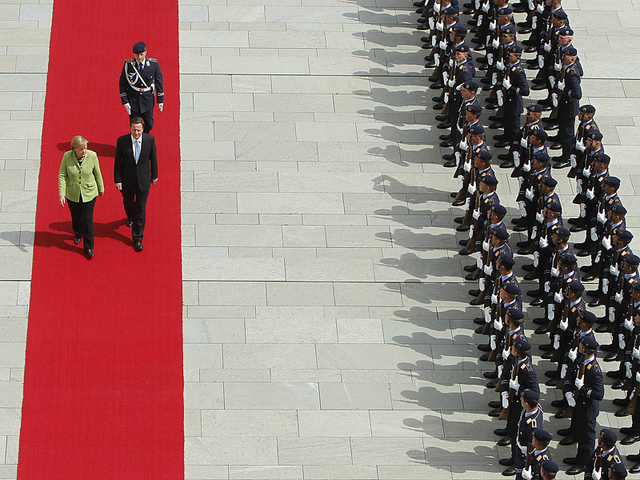Germany: the ever-dependable Mutti

Although it surprised almost no-one, German Chancellor Angela Merkel’s announcement on 20 November that she will again stand as the Chancellor-candidate for the conservative Christian Democratic Party/Christian Social Party Union (CDU/CSU) at next year’s German federal election will cause deep and heartfelt sighs of relief not only in Germany but throughout Europe.
The CDU has polled consistently in the low 30s since Chancellor Merkel’s decision last year to allow asylum seekers to be processed not in the first country of entry to the EU but in Germany—where most were headed anyway—resulting in well over a million people entering Germany. That’s well below the CDU/CSU’s result of nearly 42% at the 2013 federal election although the Chancellor’s personal popularity has remained solid, at about 50%.
The reason for this is that most Germans still see her as capable, sensible and reliable—an island in a sea of trouble. According to the most recent German polling, nearly 2 out of every 3 German voters (64%) warmly welcome her decision to stand again; fully 89% of the CDU/CSU’s own voters support her decision. And the CDU/CSU’s support among German voters has increased too, to 36%.
That’s still well below the CDU/CSU’s vote in 2013. But the lesson is clear: while Germans aren’t at all happy about the Chancellor’s policy on asylum seekers they want her as Chancellor.
She has consistently out-polled, as preferred Chancellor, any alternatives offered by her coalition partner, the Social Democratic Party (SPD). Under Deputy Chancellor Sigmar Gabriel the SPD’s support has fallen to levels (21% in the most recent polls) that call into question whether the party of Brandt and Schmidt still qualifies as a major party. The very popular SPD Foreign Minister, Frank-Walter Steinmeier, looks like becoming German President when the incumbent, Joachim Gauck, retires early next year, so he won’t be a contender.
There’s speculation that the current President of the European Parliament, Martin Schulz, might be drafted by the SPD to face Merkel. He’s announced that he will return to German politics, probably initially as Foreign Minister in the Grand Coalition. But Merkel would probably still have little trouble against him, if he stands as the SPD Chancellor candidate. And there’s simply no-one in her own CDU who’s considered a serious rival to her.
So Merkel is the best thing the CDU/CSU has going for it and there must be a good chance of the Union again becoming the largest party in next year’s election. It might again however have to form a Grand Coalition with the SPD. Even then, an overall majority will be hard to find and might require some creative coalition-building. It might, for example, come as a surprise in the Australian political context to hear that, following elections earlier this year, the conservative CDU is the junior coalition partner to the Greens in the German state of Baden-Württemberg, under a very popular Greens Premier.
There are however serious risks and a year is a very long time in politics. The biggest risk is that votes will be lost on the right, where the extremist and xenophobic Alternative for Germany (AfD) remains very popular among Germans worried about the world, Europe, asylum seekers and their jobs. The AfD is now represented in several state parliaments, is likely to enter others in the lead-up to the federal election, and is bound to enter the Bundestag too. It has consistently polled federally in the low teens (currently around 13%).
In the aftermath of Donald Trump’s win this should sound familiar. The same dynamics are at work in Germany, as they are elsewhere throughout Europe.
Being German Chancellor isn’t an easy job and it’s unlikely to get any easier. Whoever’s elected next year will need to address a range of huge problems confronting Germany and the EU, the Trump presidency and Brexit to name just two. And the European integration project, a cornerstone of German security policy since the end of World War 2, is looking sick.
The EU’s future might also take another hit, depending on the outcome of the pending French (and other) elections and the possible demise of Italian Prime Minister Renzi if his constitutional changes are rejected. In particular, the Italian referendum on 4 December could be a big problem for Merkel. Matteo Renzi has said he will resign if he loses the referendum, which could have serious, wider repercussions in Europe.
It’s little wonder then that many Europeans, including many European governments, will be relieved that Merkel is standing again and should win, all else being equal. Germans aren’t alone in wanting to put their faith in the hands of Angela Merkel. Many rely on her to steer Europe through the chaos European countries are facing.
So Germany’s importance as Europe’s leader will simply continue to grow as will Chancellor Merkel’s central role as Europe’s strongest and most reliable leader. Germany’s voice on global strategic and economic issues is also becoming more influential.
Given all of this, Australia should be aiming to have the best and most substantive relationship possible with Germany and with its next Chancellor. This is also something the Germans want with us. They’ve chosen Australia as their key strategic partner in the Asia-Pacific region and we must keep working at this. The withdrawal of our closest partner, Britain, from the EU and the uncertainties associated with the Trump presidency have made developing this kind of relationship with Germany even more vital for Australia. We too should welcome Angela Merkel standing again as Chancellor.









